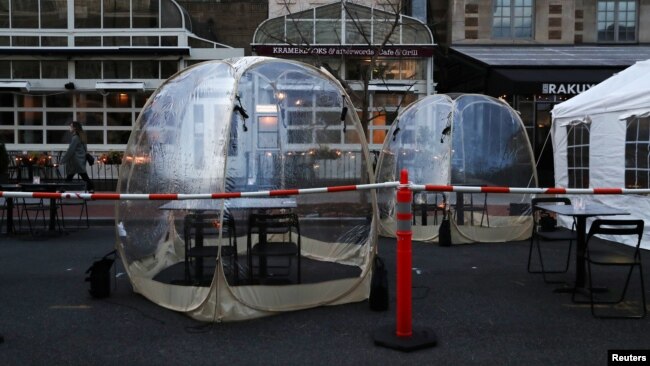テントで食事を!? Wow!!
何これ?って写真に驚いて聞いてみました。
以前、バブルの中の体操、バーでの規制棒をお伝えしたことがありましたが、今回はテント飲食です。
創造的な思考錯誤、なにが正解か分かりませんが、接触を減らす企業努力。 すごいですね!!!
すべての人々に、社会に、創意工夫がマスト。
これって、コロナ時代だけじゃなく常に必要なことですね。
この経験が、次の未知のウイルス到来にもきっと役立つはず。
そんな世界は見たくないけど。。。
皆さん、最近夜空を眺めていますか?
深夜、冬の星座に心癒されます。
地球は大変な時期ですが、そんなことどこ吹く風と美しい光を放っています。あまりに静かな星空に、空間と時間の隔たりを感じます。
さぁ、今日のVOAニュース。
Here we go!!
飲食店のテントはコロナウイルス感染を防ぐことができるか?
Can Tents at Restaurants Prevent Coronavirus Infections?
2020/11/29
レストランの中には、人々が食事をしている間、お互いに離れていられるように、プラスチック製のテントを提供しています。しかし、これらのテントは、コロナウイルスの健康危機の中、外で食事をする安全な方法なのでしょうか?
健康の専門家は、屋外のテント店中で食べるよりも少しは安全だと言います。しかし、すべてのテントが同じではない、と付け加えます。
多くのレストランでは、単一のテントや、人々が店内で一緒に食事をとることを避ける他の屋外構造物を設置しています。人々が店内にいるとコロナウイルスはより簡単に広がります。
専門家は、テントは空気の循環が良くすべきだと言います。例えば、4つの壁と屋根があるテントは、屋内のダイニングルームよりも空気の循環が良くないかもしれません。
「構造物を通る空気の流れが多ければ多いほど良いのです。 」とアイザック・ワイスヒューズ博士は言います。彼はコーネル大学の公衆衛生の専門家です。
テントは創造的な答えですが、毎日会わない人と共有すべきではありません。このアドバイスはクレイグ・ヘドバーグ氏のものです。彼はミネソタ大学公衆衛生学部の教授です。
「他の人との共有空間に入らないようにしていらえるなら、それは良いことです。 」と彼は付け加えています。
オーブリー・ゴードン氏はミシガン大学公衆衛生学部の准教授です。彼女は、テントは清掃され、1 つのグループの人々 によって使用された後、少なくとも 20 分間は開いたままにしておくべきであると述べています。また、給仕者は直接食べ物を出さず、テントの外に置いておくべきだといいます。そうすれば感染症のリスクを減らすことができます。
テントは、多くの地域で飲食店の中に人が集まることを禁止する制限がある場合に、レストランが人々に食べ物を提供することができる方法です。しかし、テントを使用することは追加のコストを意味します。
デトロイトでは、ルーメンレストランは加熱された構造のために2時間で一人当たり30ドルを要求しています。ルーメンには6人が座れる大きめのテントがあります。グループは少なくとも300ドル相当の食事をしなければなりません。
テントを空にするたびに、構造物は除菌剤で掃除され、30分間換気されている、とレストランの経営パートナーであるギャビー・ミルトンさんは言っています。
Can Tents at Restaurants Prevent Coronavirus Infections?
 Pedestrians walk past temporary tents and structures erected outside of restaurants meant for outdoor dining in Washington, U.S. November 24, 2020. (REUTERS/Leah Millis)
Pedestrians walk past temporary tents and structures erected outside of restaurants meant for outdoor dining in Washington, U.S. November 24, 2020. (REUTERS/Leah Millis)
Some restaurants are providing plastic tents so people can stay separated from each other while they eat. But are these tents a safe way to eat out during the coronavirus health crisis?
Health experts say outdoor tents are a little safer than eating inside. But, not all tents are equal, they add.
Many restaurants are putting up single tents, and other outdoor structures that let people who are eating together avoid being indoors. The coronavirus spreads more easily when people are indoors.
Experts say the tents should have good air circulation. A tent with four walls and a roof, for example, might not have better air circulation than an indoor dining room.
“The more airflow through the structure, the better it is,” says Dr. Isaac Weisfuse. He is a public health expert at Cornell University.
Tents are a creative answer, but should not be shared with people you do not see every day. That advice is from Craig Hedberg. He is a professor at the University of Minnesota School of Public Health.
“If it’s keeping you from being in a common airspace with other people, then that’s a good thing,” he added.
Aubree Gordon is an associate professor at the University of Michigan School of Public Health. She said tents should be cleaned and left open for at least 20 minutes after they are used by one group of people. She also said servers should not directly serve food but should leave it outside the tent. This would decrease the risk of infection.
Tents are a way that restaurants can serve people food when many areas have restrictions barring people from gathering inside eating places. But using them means additional costs.
In Detroit, Lumen restaurant asks $30 for each person for a heated structure for two hours. Lumen has larger tents that can seat six people. The group must buy at least $300 worth of food.
Each time the tent is emptied, the structure is cleaned with sanitizer and aired out for 30 minutes, said Gabby Milton, who is the restaurant’s managing partner.
________________________________________________________________
Words in This Story
tent – n. a shelter made of cloth that is easy to put up and take down for use outside
roof –n. the top covering of a building or structure
circulation – n. the movement of air through a structure
sanitizer – n. something that makes surfaces clean and free from disease